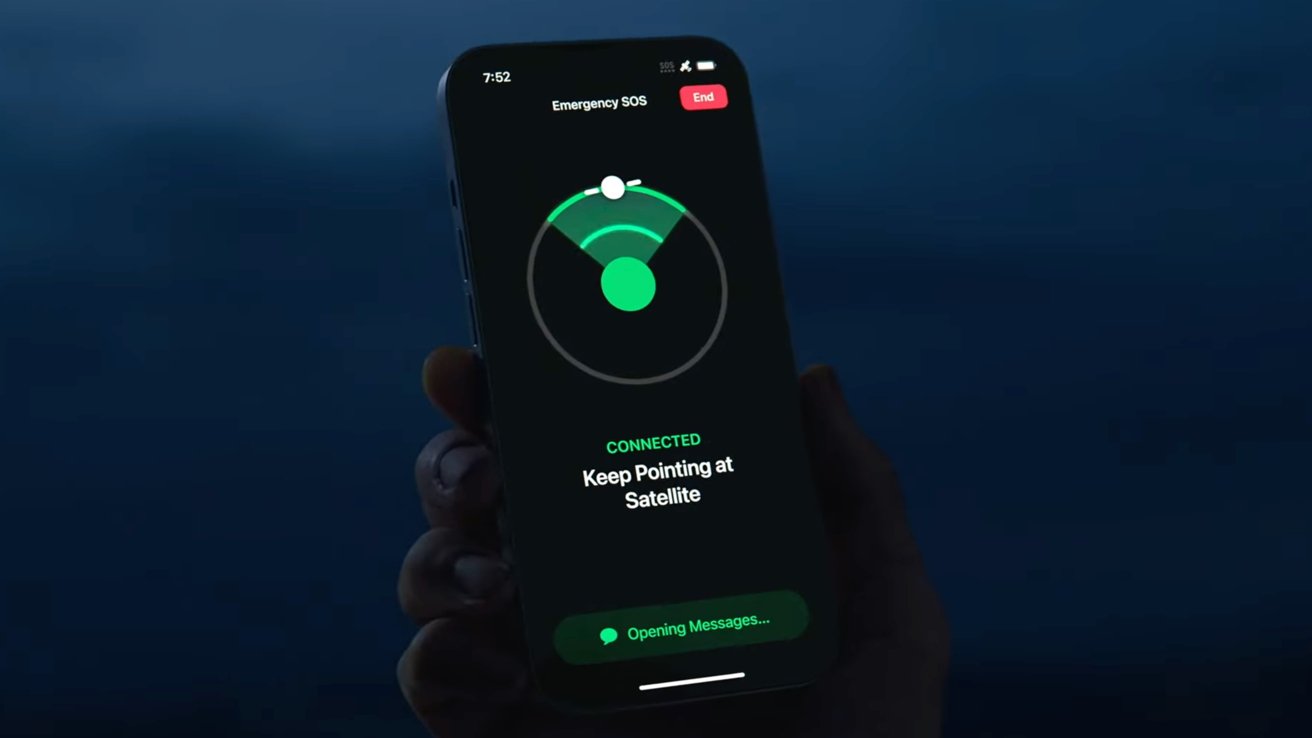iPhone 14 Satellite SOS saves stranded New Zealand hikers
Two hikers trapped Wednesday on a riverbank in New Zealand's Arthur's Pass National Park used the satellite SOS feature on their iPhone 14 to summon help for first time in the country.

SOS via Satellite
As the result of heavy rain runoff in the area, water levels near the Sudden Valley Stream in Arthur's Pass began to rise to an unsafe level, according to news reports. The hikers were unable to navigate around or through the hazard and summoned emergency services using the iPhone 14's Emergency SOS by Satellite feature.
The feature connects the iPhone to a network of satellites operated by GlobalStar, enabling users to locate a satellite overhead, then send a series of pre-formatted messages and their precise location. The information is transmitted to ground crews for verification, who then dispatch emergency services.
Emergency SOS by Satellite launched in November 2022 in the U.S. and Canada, after Apple previewed the feature with the launch of the iPhone 14. Apple activated the feature in Australia and New Zealand in May, after introducing the feature in several European Union nations following the U.S. and Canada launch.
New Zealand air and rescue ambulance operator GCH Aviation and Canterbury West Air Rescue Service coordinated the rescue efforts. Canterbury confirmed its involvement in the rescue operation through its Instagram account.
"Did you know that an iPhone 14 has an SOS feature that can connect via satellite and alert authorities if you become lost or injured out in the backcountry?
"Yesterday we were able to respond to some hikers stranded in a river because they had this technology with them," the company reported.
Due to the relative novelty of Apple's service, the air rescue company advised its customers instead to rely on Personal Locator Beacons (PLBs), dedicated devices which use satellite Global Positioning System (GPS) coordinates.
Read on AppleInsider

Comments
That sounds more like an anti-Apple stance, or an unwillingness to adapt to changing technology. Before the PLB's did they recommend flares? And before flares was it "yelling really loudly"?
New Zealand’s terrain is extremely difficult terrain and with it brings issues that even the incumbent tech such as PLBs and EPERBs can’t get around. So a new tech like this isn’t proven yet.
My real question is though, why weren’t these trampers heading out with an EPERB? That’s potential suicide even on designated walkways like Arthur’s Pass.
I think it's objectively been proven to work countless times over the past year. it's also a built-in feature in the iPhone (which I can only assume will be in nearly all smartphones within a few years) that doesn't require an additional device to be purchase, activated, subscribed, and carried by individuals who otherwise wouldn't have had a dedicated unit on their person (as we've seen countless times in the last year).
One use case working doesn’t prove it works. Working in a desert with wide open skies is different to being in the bush where canyons can prevent GPS and satellites from working. Hell, satellite systems don’t always work in a city.
A wait and see process is a good idea to prove that it’s reliable enough for people to ditch EPERBs and other PLBs.
Just because it works in your country doesn’t mean it will in others. Plain and simple.
when I left NZ to travel abroad, many years ago, I was amazed at how advanced some tech was in our country compared to Aus/US/Uk - adoption of ATMs, Chip & Pin cards, interbank funds transfers (fast, quick, free), GSM roaming, broadband speed and adoption, etc. we aren’t laggards at all.
it is for the less frequent hiker, who usually isn’t so completely off the beaten track but even so can still get in trouble.
I used to work for the only gas supplier in New Zealand and I was there when a critical system was being upgraded. They were upgrading with serial ports instead of USB/Bluetooth because it wasn’t in the budget to do so. I mentioned that in 10 years time they’d be forced to as serial ports would be removed and that project will cost them $20,000,000. Ten years later I was right.
The banking system here is still far behind in many respects. Take for example TSB. They hand over EFTPOS cards by default as opposed to debit cards.
There’s a lack of support in New Zealand for ApplePay with only a small handful of the major banks supporting it. While we do have interbank transfers, we’ve only just got it to the point where it’s within the same day and it’s certainly not instant like direct transfers are with PayPal or other systems used in America, unless you’re transferring within the same bank.
New Zealand leads the way in a number of tech but there is still a wariness for many. Look how long it took New Zealand to get 3G, 4G, etc and 5G is still only in small pockets.
Rural internet is lagging behind many countries and that’s our biggest industry. Don’t even get me started on the lack of technological interest the majority of farmers have, even though it will make them more money in the grand scheme of things.
I'm not saying the whole of New Zealand is like this but corporate New Zealand certainly is. Hell, I was involved in a Ministry of Justice project in 2005 that saw them upgrading their PCs to Windows 2000… in 2005… with Win2k already unsupported by M$.
I was a Systems Engineer in Parliament in 2010 and the rigmarole even the PM had just to get his emails on his iPad because the iPad was only just released in New Zealand at the time was ridiculous. If that’s at the highest level of the country you can see how it filters down.